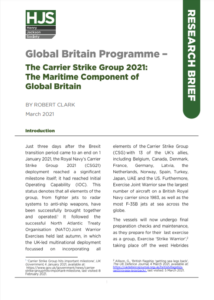‘The Carrier Strike Group 2021: The Maritime Component of Global Britain’
By Robert Clark, Research Fellow
March 2021
Introduction:
“Just three days after the Brexit transition period came to an end on 1 January 2021, the Royal Navy’s Carrier Strike Group 2021 (CSG21) deployment reached a significant milestone itself; it had reached Initial Operating Capability (IOC). This status denotes that all elements of the group, from fighter jets to radar systems to anti-ship weapons, have been successfully brought together and operated. It followed the successful North Atlantic Treaty Organisation (NATO) Joint Warrior Exercises held last autumn, in which the UK-led multinational deployment focussed on incorporating all elements of the Carrier Strike Group (CSG) with 13 of the UK’s allies, including Belgium, Canada, Denmark, France, Germany, Latvia, the Netherlands, Norway, Spain, Turkey, Japan, UAE and the US. Furthermore, Exercise Joint Warrior saw the largest number of aircraft on a British Royal Navy carrier since 1983, as well as the most F-35B jets at sea across the globe.
The vessels will now undergo final preparation checks and maintenance, as they prepare for their last exercise as a group, Exercise ‘Strike Warrior’, taking place off the west Hebrides range in May 2021, before departing Portsmouth to embark upon its maiden operational deployment in the weeks after. The first likely stop will be to conduct exercises with NATO partners in the Mediterranean, before heading east of Suez. Charting the Indian Ocean, South China Sea, and Pacific Ocean, this deployment, the largest of any European naval power in 20 years, should be framed within the appropriate analytical frameworks for broader clarity of what precisely this deployment represents.
Here, issues will be addressed which policy planners need to consider, including; future CSG costs, burden sharing with international allies and partners, logistical resupply, and future basing rights, and port facilities. The UK’s future ability to engage with its Canada, Australia and New Zealand (CANZUK) allies and its Five Power Defence Agreement (FPDA) partners will highlight important sustainment considerations for future maritime deployments to the Indo-Pacific. The UK MOD and FCDO should act to resolve these issues as a matter of priority if the Royal Navy is to maintain a ‘persistent’ presence in the Indo-Pacific as stated.”
About the Author:

Robert Clark, Research Fellow
Robert completed a BA in International Relations and Arabic (First Class Honours) at Nottingham Trent University, and an MA in International Conflict Studies (Distinction) at King’s College London.
Robert’s main research interests include emerging technologies within defence, alliance building and the trans-Atlantic partnership, and authoritarian threats to the global order. Robert’s most recent publications include for the NATO Defence College and Civitas.
He has regularly submitted evidence for both the Defence and Foreign Affairs Select Committees, and is a regular contributor for the UK Defence Journal, in addtion to writing for The Telegraph, CapX, and The Wavell Room.
Robert served for nine years in the British Army, serving in Iraq and Afghanistan.



